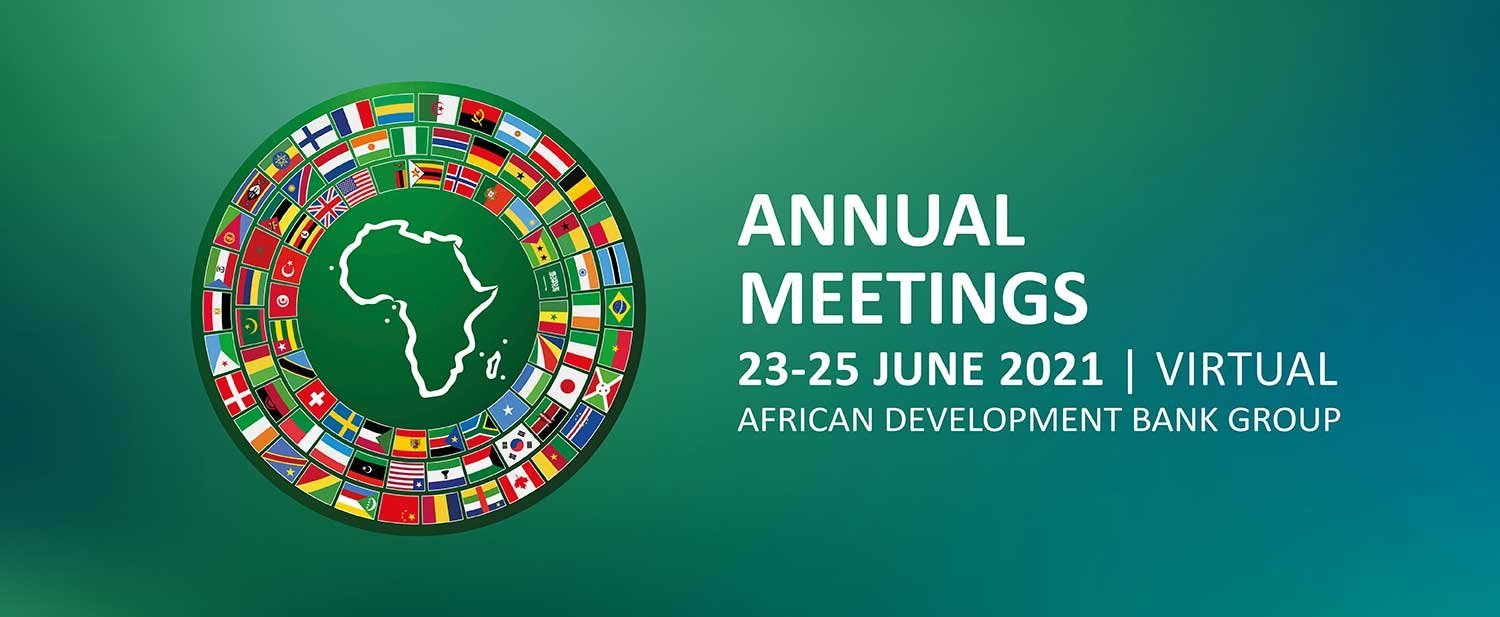African Development Bank Group 2021 Annual Meetings

About 2021 Annual Meetings
The COVID-19 pandemic has caused an unparalleled health and economic shocks to the world. As of 17 March 2021, there were about 120,383,919 confirmed cases of infections since the start of the pandemic worldwide: the majority of which occurred in Europe (30.4%), followed by North America (28.3%), Asia (21.9%), South America (16.1%), and Africa (3.4%). To date, 75,732,772 cases have recovered globally, representing 63.2% of confirmed cases, while 2,664,386 deaths have been recorded. With the discovery and rollout of vaccination, a total of 363,691,238 vaccine doses have been administered globally as of 16 March 2021. In Africa, the pandemic affected 47 countries with confirmed cases totaling 2,931,728 and 74,979 deaths as at 17 March 2021.
Background and Rationale
While Africa has been relatively spared by the (direct) health consequences of COVID-19, the continent will likely face the most severe economic and social costs from the pandemic. Africa’s GDP in 2020 fell by 2.1%, the worst economic performance in half a century. An estimated 24.6 to 30 million jobs could be lost as a fallout of the pandemic, driving up the total number of people living in extreme poverty to 463 million. While recovery is projected for 2021 with a GDP growth of 3.4%, the outlook is, however, fraught with great uncertainty emanating from external and domestic risks.
Since the COVID–19 pandemic began in early 2020, governments have announced fiscal stimulus packages ranging in cost from about 0.02% of GDP in South Sudan to about 10.4% of GDP in South Africa. The Bank estimates that African governments need additional gross financing of about $154 billion in 2020/21 to respond to the crisis. To rebalance their economies and help citizens, businesses and public institutions cope with the crisis, governments are resorting to expansionary monetary and fiscal policies in unprecedented proportions, leading to a surge in government financing needs in Africa. These fiscal stimulus packages have largely had immediate, direct implications for budgetary balances, borrowing needs, and debt levels.
With the sluggish growth and increased need for financial resources to mitigate emerging challenges, fiscal deficits in Africa are projected to double, and debt levels to build up by an additional 10 percentage points of GDP by 2021. A long list of African countries may experience similar development in the months ahead. The COVID-19 shock is also inducing a deterioration of credit ratings of African countries. Indeed, jumpstarting growth and removing the debt obstacle to development is of utmost priority for Africa. Failure to do so may lead to debt overhang and have a critical toll on inclusive development.
Thus, Africa must turn the COVID-19 crisis into opportunities. The continent needs to intensify its current approach to containing the pandemic and beginning to prepare for the post-COVID era. As the premier development finance institution in Africa, the Bank has appropriately scaled up its efforts to mobilize global resources (financial and non-financial) as well as knowledge and experience sharing to build Africa’s resilience in a post COVID-19 world. The pandemic presents opportunities to embrace rapid industrialization, digitization of socioeconomic activities, increased investment in health infrastructure as well as medical and pharmaceutical capabilities, improved macroeconomic and public financial management and architecture, large-scale institutional strengthening, increased prominence for public-private partnerships for inclusive development, etc.
Proposed Theme
The proposed theme for the 2021 Annual Meetings is “Building Resilient Economies in Post COVID-19 Africa”. This theme is chosen to provide a framework for Governors of the Bank to share their experiences in addressing the COVID-19 pandemic and the policy responses/measures they are employing to rebuild their economies. RMCs will have the opportunity to discuss the nature of the support they need from IFIs such as the AfDB, as well as the estimated cost of recovery for their economies. The knowledge events that will be organized around the theme will provide forums for exchanging views on strategies and promoting peer-to-peer learning and solution-oriented policy dialogue for building the Africa we want in the post-COVID-19 era.